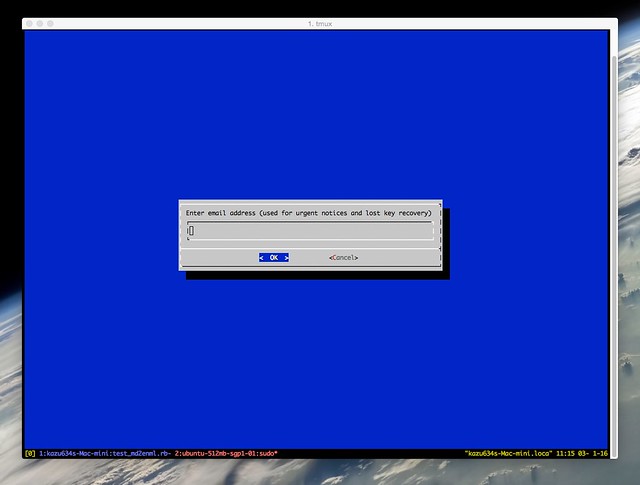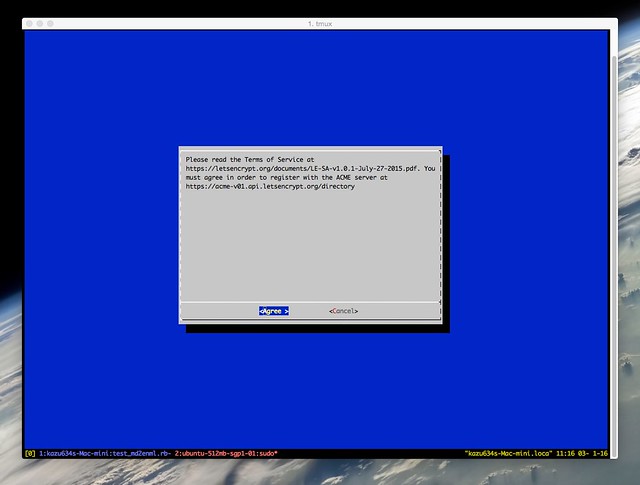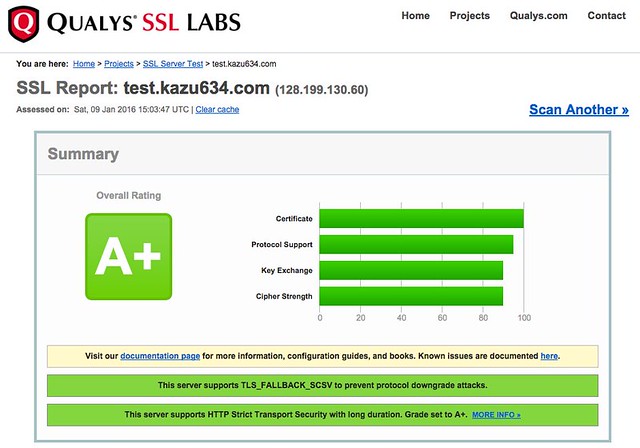19 KiB
+++ Categories = [ "nginx" ] Description = "nginx + Let's Encryptを用いてhttp/2環境を構築してみました。" Tags = [] date = "2016-01-11T23:32:47+08:00" title = "nginx + let's encryptを利用してHTTP/2を有効化した" url = "/2016/01/11/nginx-lets-encrypt-enabling-http2/" thumnail = "images/24021542270_0971890cc8_z.jpg" +++
nginx+Let's Encryptでhttp/2環境を構築したのでその時のメモです。
nginxのインストール・セットアップ
nginxで必要になる前提パッケージ
libgeoip-devをインストールします:
% aptitude install libgeoip-dev
nginx-buildのインストール
cubicdaiya/nginx-buildをインストールします:
% wget https://github.com/cubicdaiya/nginx-build/releases/download/v0.6.5/nginx-build-linux-amd64-0.6.5.tar.gz
nginxのインストール
以下の手順でnginxをインストールします:
% vi configure.sh
% ./nginx-build -d temp -v 1.9.9 -c configure.sh -zlib -pcre -openssl
% cd temp/nginx/1.9.9/nginx-1.9.9
% sudo make install
なお、configure.shは以下の内容です:
#!/bin/bash
./configure --with-cc-opt='-g -O2 -fPIE -fstack-protector --param=ssp-buffer-size=4 -Wformat -Werror=format-security -D_FORTIFY_SOURCE=2' ¥
--prefix=/usr/share/nginx --conf-path=/etc/nginx/nginx.conf --http-log-path=/var/log/nginx/access.log ¥
--error-log-path=/var/log/nginx/error.log --lock-path=/var/lock/nginx.lock --pid-path=/run/nginx.pid ¥
--http-client-body-temp-path=/var/lib/nginx/body --http-fastcgi-temp-path=/var/lib/nginx/fastcgi ¥
--http-proxy-temp-path=/var/lib/nginx/proxy --http-scgi-temp-path=/var/lib/nginx/scgi ¥
--http-uwsgi-temp-path=/var/lib/nginx/uwsgi --with-debug --with-pcre-jit --with-ipv6 --with-http_ssl_module ¥
--with-http_v2_module --with-http_stub_status_module --with-http_realip_module --with-http_auth_request_module ¥
--with-http_addition_module --with-http_geoip_module --with-http_gunzip_module --with-http_gzip_static_module ¥
--with-http_sub_module
nginxのセットアップ
nginxをセットアップします。
nginx起動に必要となるディレクトリ作成
nginx起動に必要となるディレクトリを作成します:
% sudo mkdir -p /var/lib/nginx/{body,fastcgi,proxy,scgi,uwsgi}
nginx設定ファイルなどのデプロイ
nginx設定ファイルなどをデプロイします:
% sudo mkdir -p /etc/nginx/{sites-available,sites-enabled}
% vi /etc/nginx/nginx.conf
% vi /etc/init.d/nginx
% sudo update-rc.d nginx defaults
% vi /etc/nginx/sites-enabled/default
nginx.confの中身は以下のとおりです:
user www-data;
# Newer version of Nginx calculates the worker_processes,
# based on the CPU cores. Use this feature:
worker_processes auto;
pid /run/nginx.pid;
# number of file descriptors used for nginx
# the limit for the maximum file descriptors on the server is usually set by the OS.
# if you don't set FD's then OS settings will be used.
worker_rlimit_nofile 100000;
events {
# determines how much clients will be served per worker
# max clients = worker_connections * worker_processes
# max clients is also limited by the number of socket connections available on the system (~64k)
worker_connections 4096;
# accept as many connections as possible
multi_accept on;
# mutex config:
accept_mutex on;
accept_mutex_delay 100ms; # default: 500 -> 100 ms
# optmized to serve many clients with each thread, essential for linux
use epoll;
}
http {
##
# Basic Settings
##
sendfile on;
tcp_nopush on;
tcp_nodelay on;
keepalive_timeout 30;
types_hash_max_size 2048;
include /etc/nginx/mime.types;
default_type application/octet-stream;
server_names_hash_bucket_size 128;
# cache informations about FDs, frequently accessed files
# can boost performance:
open_file_cache max=200000 inactive=20s;
open_file_cache_valid 30s;
open_file_cache_min_uses 2;
open_file_cache_errors on;
# allow the server to close connection on non responding client,
# this will free up memory
reset_timedout_connection on;
# request timed out -- default 60
client_body_timeout 10s;
# if client stop responding, free up memory -- default 60
send_timeout 2s;
##
# Logging Settings
##
log_format ltsv "time:$time_local\thost:$remote_addr"
"\tforwardedfor:$http_x_forwarded_for\t"
"method:$request_method\tpath:$request_uri\tprotocol:$server_protocol"
"\tstatus:$status\tsize:$body_bytes_sent\treferer:$http_referer"
"\tua:$http_user_agent\ttaken_sec:$request_time"
"\tbackend:$upstream_addr\tbackend_status:$upstream_status"
"\tcache:$upstream_http_x_cache\tbackend_runtime:$upstream_response_time"
"\tvhost:$host";
access_log /var/log/nginx/access.log ltsv;
error_log /var/log/nginx/error.log;
##
# Gzip Settings
##
gzip on;
gzip_disable "msie6";
gzip_min_length 10240;
gzip_types text/plain text/css application/json application/x-javascript text/xml application/xml application/xml+rss text/javascript;
##
# Virtual Host Configs
##
include /etc/nginx/conf.d/*.conf;
include /etc/nginx/sites-enabled/*;
}
nginxの設定ファイルの中身は以下のとおりです:
#!/bin/sh
### BEGIN INIT INFO
# Provides: nginx
# Required-Start: $local_fs $remote_fs $network $syslog $named
# Required-Stop: $local_fs $remote_fs $network $syslog $named
# Default-Start: 2 3 4 5
# Default-Stop: 0 1 6
# Short-Description: starts the nginx web server
# Description: starts nginx using start-stop-daemon
### END INIT INFO
PATH=/usr/local/sbin:/usr/local/bin:/sbin:/bin:/usr/sbin:/usr/bin:/usr/share/nginx/sbin/
DAEMON=/usr/share/nginx/sbin/nginx
NAME=nginx
DESC=nginx
# Include nginx defaults if available
if [ -r /etc/default/nginx ]; then
. /etc/default/nginx
fi
STOP_SCHEDULE="${STOP_SCHEDULE:-QUIT/5/TERM/5/KILL/5}"
test -x $DAEMON || exit 0
. /lib/init/vars.sh
. /lib/lsb/init-functions
# Try to extract nginx pidfile
PID=$(cat /etc/nginx/nginx.conf | grep -Ev '^\s*#' | awk 'BEGIN { RS="[;{}]" } { if ($1 == "pid") print $2 }' | head -n1)
if [ -z "$PID" ]
then
PID=/run/nginx.pid
fi
# Check if the ULIMIT is set in /etc/default/nginx
if [ -n "$ULIMIT" ]; then
# Set the ulimits
ulimit $ULIMIT
fi
#
# Function that starts the daemon/service
#
do_start()
{
# Return
# 0 if daemon has been started
# 1 if daemon was already running
# 2 if daemon could not be started
start-stop-daemon --start --quiet --pidfile $PID --exec $DAEMON --test > /dev/null \
|| return 1
start-stop-daemon --start --quiet --pidfile $PID --exec $DAEMON -- \
$DAEMON_OPTS 2>/dev/null \
|| return 2
}
test_nginx_config() {
$DAEMON -t $DAEMON_OPTS >/dev/null 2>&1
}
#
# Function that stops the daemon/service
#
do_stop()
{
# Return
# 0 if daemon has been stopped
# 1 if daemon was already stopped
# 2 if daemon could not be stopped
# other if a failure occurred
start-stop-daemon --stop --quiet --retry=$STOP_SCHEDULE --pidfile $PID --name $NAME
RETVAL="$?"
sleep 1
return "$RETVAL"
}
#
# Function that sends a SIGHUP to the daemon/service
#
do_reload() {
start-stop-daemon --stop --signal HUP --quiet --pidfile $PID --name $NAME
return 0
}
#
# Rotate log files
#
do_rotate() {
start-stop-daemon --stop --signal USR1 --quiet --pidfile $PID --name $NAME
return 0
}
#
# Online upgrade nginx executable [67/1833]
#
# "Upgrading Executable on the Fly"
# http://nginx.org/en/docs/control.html
#
do_upgrade() {
# Return
# 0 if nginx has been successfully upgraded
# 1 if nginx is not running
# 2 if the pid files were not created on time
# 3 if the old master could not be killed
if start-stop-daemon --stop --signal USR2 --quiet --pidfile $PID --name $NAME; then
# Wait for both old and new master to write their pid file
while [ ! -s "${PID}.oldbin" ] || [ ! -s "${PID}" ]; do
cnt=`expr $cnt + 1`
if [ $cnt -gt 10 ]; then
return 2
fi
sleep 1
done
# Everything is ready, gracefully stop the old master
if start-stop-daemon --stop --signal QUIT --quiet --pidfile "${PID}.oldbin" --name $NAME; then
return 0
else
return 3
fi
else
return 1
fi
}
case "$1" in
start)
[ "$VERBOSE" != no ] && log_daemon_msg "Starting $DESC" "$NAME"
do_start
case "$?" in
0|1) [ "$VERBOSE" != no ] && log_end_msg 0 ;;
2) [ "$VERBOSE" != no ] && log_end_msg 1 ;;
esac
;;
stop)
[ "$VERBOSE" != no ] && log_daemon_msg "Stopping $DESC" "$NAME"
do_stop
case "$?" in
0|1) [ "$VERBOSE" != no ] && log_end_msg 0 ;;
2) [ "$VERBOSE" != no ] && log_end_msg 1 ;;
esac
;;
restart)
log_daemon_msg "Restarting $DESC" "$NAME"
# Check configuration before stopping nginx
if ! test_nginx_config; then
log_end_msg 1 # Configuration error
exit 0
fi
do_stop
case "$?" in
0|1)
do_start
case "$?" in
0) log_end_msg 0 ;;
1) log_end_msg 1 ;; # Old process is still running
*) log_end_msg 1 ;; # Failed to start
esac
;;
*)
# Failed to stop
log_end_msg 1
;;
esac
;;
reload|force-reload)
log_daemon_msg "Reloading $DESC configuration" "$NAME"
# Check configuration before reload nginx
#
# This is not entirely correct since the on-disk nginx binary
# may differ from the in-memory one, but that's not common.
# We prefer to check the configuration and return an error
# to the administrator.
if ! test_nginx_config; then
log_end_msg 1 # Configuration error
exit 0
fi
do_reload
log_end_msg $?
;;
configtest|testconfig)
log_daemon_msg "Testing $DESC configuration"
test_nginx_config
log_end_msg $?
;;
status)
status_of_proc -p $PID "$DAEMON" "$NAME" && exit 0 || exit $?
status_of_proc -p $PID "$DAEMON" "$NAME" && exit 0 || exit $?
;;
upgrade)
log_daemon_msg "Upgrading binary" "$NAME"
do_upgrade
log_end_msg 0
;;
rotate)
log_daemon_msg "Re-opening $DESC log files" "$NAME"
do_rotate
log_end_msg $?
;;
*)
echo "Usage: $NAME {start|stop|restart|reload|force-reload|status|configtest|rotate|upgrade}" >&2
exit 3
;;
esac
:
/etc/nginx/sites-enabled/defaultの中身は以下のとおりです:
server {
# allow access from localhost
listen 80 reuseport backlog=1024;
server_name test.kazu634.com;
root /usr/share/nginx/html;
index index.html index.htm;
location / {
gzip on;
gzip_types text/css text/javascript;
gzip_vary on;
gzip_static always;
gunzip on;
try_files $uri $uri/ /index.html;
}
}
# Denies the access without the pre-defined virtual host.
server {
listen 80 default_server;
server_name _;
return 444;
}
Let's Encyptを用いて証明書を取得する
以下の手順でLet's Encryptから証明書を取得します:
% git clone https://github.com/letsencrypt/letsencrypt
% cd letsencrypt
% ./letsencrypt-auto certonly --webroot -d test.kazu634.com --webroot-path /usr/share/nginx/html/
途中で以下のダイアログが表示されます。ひとつ目のダイアログではメールアドレスを入力します:
次のダイアログでは[Agree]ボタンを押します:
すると以下のような注意書きが表示されます:
IMPORTANT NOTES:
- If you lose your account credentials, you can recover through
e-mails sent to simoom634@yahoo.co.jp.
- Congratulations! Your certificate and chain have been saved at
/etc/letsencrypt/live/test.kazu634.com/fullchain.pem. Your cert
will expire on 2016-04-02. To obtain a new version of the
certificate in the future, simply run Let's Encrypt again.
- Your account credentials have been saved in your Let's Encrypt
configuration directory at /etc/letsencrypt. You should make a
secure backup of this folder now. This configuration directory will
also contain certificates and private keys obtained by Let's
Encrypt so making regular backups of this folder is ideal.
- If you like Let's Encrypt, please consider supporting our work by:
Donating to ISRG / Let's Encrypt: https://letsencrypt.org/donate
Donating to EFF: https://eff.org/donate-le
これで終わりです:
Grade A+取得の道
Qualys SSL Labsで評価A+を目指した軌跡です。基本はnginx - 我々はどのようにして安全なHTTPS通信を提供すれば良いか - Qiitaを参考にして設定しています。
暗号化スイートの選択
以下のように設定しました:
ssl_protocols TLSv1.2 TLSv1.1 TLSv1;
ssl_ciphers ECDHE-RSA-AES128-GCM-SHA256:ECDHE-ECDSA-AES128-GCM-SHA256:ECDHE-RSA-AES256-GCM-SHA384:ECDHE-ECDSA-AES256-GCM-SHA384:ECDHE-RSA-AES128-SHA256:ECDHE-ECDSA-AES128-SHA256:ECDHE-RSA-AES128-SHA:ECDHE-ECDSA-AES128-SHA:ECDHE-RSA-AES256-SHA384:ECDHE-ECDSA-AES256-SHA384:ECDHE-RSA-AES256-SHA:ECDHE-ECDSA-AES256-SHA:AES128-GCM-SHA256:AES128-SHA256:AES128-SHA:AES256-GCM-SHA384:AES256-SHA256:AES256-SHA:DES-CBC3-SHA;
ssl_prefer_server_ciphers on;
OCSP Staplingの設定
以下のように設定しました:
ssl_stapling on;
ssl_stapling_verify on;
resolver 8.8.4.4 8.8.8.8 valid=300s;
resolver_timeout 10s;
ssl_dhparam
以下のコマンドを実行し、DH鍵交換に使用する暗号化ファイルを作成しました:
% sudo openssl dhparam -out /etc/letsencrypt/live/test.kazu634.com/dhparams_4096.pem 4096
作成後以下のように設定を実施しました:
ssl_dhparam /etc/letsencrypt/live/test.kazu634.com/dhparams_4096.pem;
HTTP Strict Transport Security(HSTS)の付与
以下のように設定を行います:
# Enable HSTS (HTTP Strict Transport Security)
add_header Strict-Transport-Security "max-age=31536000; includeSubdomains; preload";
TLS Session Ticketsの有効化
以下のコマンドで鍵ファイルを作成します:
# openssl rand 48 > /etc/letsencrypt/live/test.kazu634.com/ticket.key
その後、以下のように設定を実施します:
ssl_session_tickets on;
ssl_session_ticket_key /etc/letsencrypt/live/test.kazu634.com/ticket.key;
結論
まとめると、以下のようなnginxの設定ファイルを作成します:
server {
# allow access from localhost
# listen 80 reuseport backlog=1024;
listen 443 ssl http2 backlog=1024;
server_name test.kazu634.com;
ssl_certificate /etc/letsencrypt/live/test.kazu634.com/fullchain.pem;
ssl_certificate_key /etc/letsencrypt/live/test.kazu634.com/privkey.pem;
ssl_dhparam /etc/letsencrypt/live/test.kazu634.com/dhparams_4096.pem;
ssl_session_cache shared:SSL:3m;
ssl_buffer_size 4k;
ssl_session_timeout 10m;
ssl_session_tickets on;
ssl_session_ticket_key /etc/letsencrypt/live/test.kazu634.com/ticket.key;
ssl_protocols TLSv1.2 TLSv1.1 TLSv1;
ssl_ciphers ECDHE-RSA-AES128-GCM-SHA256:ECDHE-ECDSA-AES128-GCM-SHA256:ECDHE-RSA-AES256-GCM-SHA384:ECDHE-ECDSA-AES256-GCM-SHA384:ECDHE-RSA-AES128-SHA256:ECDHE-ECDSA-AES128-SHA256:ECDHE-RSA-AES128-SHA:ECDHE-ECDSA-AES128-SHA:ECDHE-RSA-AES256-SHA384:ECDHE-ECDSA-AES256-SHA384:ECDHE-RSA-AES256-SHA:ECDHE-ECDSA-AES256-SHA:AES128-GCM-SHA256:AES128-SHA256:AES128-SHA:AES256-GCM-SHA384:AES256-SHA256:AES256-SHA:DES-CBC3-SHA;
ssl_prefer_server_ciphers on;
ssl_stapling on;
ssl_stapling_verify on;
resolver 8.8.4.4 8.8.8.8 valid=300s;
resolver_timeout 10s;
# Enable HSTS (HTTP Strict Transport Security)
add_header Strict-Transport-Security "max-age=31536000; includeSubdomains; preload";
root /var/www/blog_cache;
index index.html index.htm;
location / {
gzip on;
gzip_types text/css text/javascript;
gzip_vary on;
gzip_static always;
gunzip on;
try_files $uri $uri/ /index.html;
}
}
# Denies the access without the pre-defined virtual host.
server {
listen 80 default_server;
server_name _;
return 444;
}


